#mecommerce
Explore tagged Tumblr posts
Video
instagram
❓What would #extra #money each month mean for you and your loved ones? *#school🏫 *paying #bills 💵 on time⏰ *a new 🚗 *a new 🏡 *#vacations🌴🌊 What if I told you it was truly 100% #FREE⁉️ I will help you every step of the way! Want more info? 📩📥Message me or leave a comment! #mecommerce #entrepreneurship #socialmedia #instalike #instamood #instagood #instadaily
#vacations🌴🌊#free⁉️#mecommerce#instadaily#entrepreneurship#school🏫#instalike#extra#socialmedia#instagood#money#bills#instamood
0 notes
Video
Happy Earth day come join kargoe and help @sea_legacy do more good to clean the oceans and make everyone aware and active to be part of being the change , at kargoe you can #shopsellsave🌎 and endorse projects and charities you believe in . #mecommerce #beauty #gokargoe (at Wall Street)
0 notes
Photo

We are now in an era of ginormous technological advancements. In the palm of our hands, we can create, connect, expand, build Success Digitally !!! If you have a phone, tablet, laptop, PC or any means of connecting to the internet 📱💻⌚️🖥 wifi and a Dream ⭐️🌈❤😃 Social Media is your answer !!! Be part of the Digital Revolution !!! #nowrecruiting And leverage on The Beauty of Social ✨ #DiscoverTheBestYou #MeCommerce #DigitalBusiness #SocialEntreprenuer #BeautyofSocial #SocialBiz
#beautyofsocial#socialbiz#socialentreprenuer#mecommerce#digitalbusiness#discoverthebestyou#nowrecruiting
0 notes
Photo

Repost @ecommv ¿Como les comienza la semana a todos esos #eCommercers? . Hoy les traigo una selección de 8 libros para que hablemos un poco de ellos, estaré hablando en la semana de cada uno en particular. . Pero si te gustaría comenzar a leer alguno, pídemelo en un comentario aquí en el Post y te hablo por DM para enviártelo. Y claro si quieres recomendarle algún libro a alguien, taggealo aquí en un comentario. . ¡¡¡¡Espero leerlos para enviarlo a cada uno su libro!!!! . Abrazo a todos y que tengan una maravillosa semana. . . . . . . . #yosoyexitoso #exitos #exitoso #lasemilladelexito #libros #librosrecomendados #librorecomendado #instalibro #librosmiadiccion #librosenespañol #megustaleer #leeresvivir #amoleer #meencantaleer #leermola #leeresvida #galleery #leeresunplacer #leerescrecer #mecommerce #negocioecommerce #emprendersepuede #emprenderencomunidad #marketingdigital #digitalmarketing #socialmediamarketing #marketingonline #marketingtips #marketingstrategy (en Punta Cana Republica Dominicana) https://www.instagram.com/p/CE201tynQ9w/?igshid=5pk7jvcmq19t
#ecommercers#yosoyexitoso#exitos#exitoso#lasemilladelexito#libros#librosrecomendados#librorecomendado#instalibro#librosmiadiccion#librosenespañol#megustaleer#leeresvivir#amoleer#meencantaleer#leermola#leeresvida#galleery#leeresunplacer#leerescrecer#mecommerce#negocioecommerce#emprendersepuede#emprenderencomunidad#marketingdigital#digitalmarketing#socialmediamarketing#marketingonline#marketingtips#marketingstrategy
0 notes
Text
A pivot from tech to empowerment at bra startup ThirdLove

Marketing images for ThirdLove feature models of many shapes and races. | Sarah Lawrence for Vox
How a woke brand is made.
Convincing 100 women to show up at a warehouse and take photos of their chests is no easy feat. Convincing them through a Craigslist ad is nearly impossible. But that’s what lingerie company ThirdLove did in 2013 while developing a proprietary app that was designed to predict better bra sizes.
“The app was problematic, to say the least,” said a former engineer we’ll call Ben. “It basically only worked if the photos were good.” When people tried out the at-home instructions exactly — take two pictures in front of a full-length mirror in good lighting while wearing a tight tank top, making sure the phone is at waist-height — the results were reliably accurate. But getting people to do that was difficult.
“The app was problematic, to say the least”
Then there was the matter of data security. Co-CEO David Spector told Inc the company never “recorded” people’s images, but no one was clear on what that meant. Once the photos were submitted via the app, where did they go?
After securing $8 million in funding, ThirdLove stopped developing the app. The technology was complicated, the data difficult to get right. In its wake, the founders doubled down on a narrative that would help set them apart in the competitive but old-school lingerie market: diversity and female empowerment.
To co-CEO Heidi Zak, these tenets had been there all along. “We set out to build a brand for all women of all sizes,” she told Vox. “Look at what we’ve done in the past year or two” — the company has featured diverse models in almost all of its recent marketing campaigns — “We wouldn’t do all these things if that wasn’t core to who we are.”
Many employees aren’t buying it. “It’s all about the money,” said a member of the marketing team we’ll call Liz. Interviews with 10 current and former employees, all of whom asked to remain anonymous, paint a picture of ThirdLove’s transformation, from a data-driven bra brand to a bastion of diversity and inclusion, as one of keen opportunism. The gap between their viewpoint and the founders’ suggests that while the company has succeeded in pushing the lingerie industry to be more inclusive on multiple fronts, it has a long way to go to convince the workers who helped build the brand of its motives.
David Spector and Heidi Zak founded ThirdLove (then called MeCommerce) in 2012 to improve the bra shopping experience. Both came from big tech backgrounds — Zak worked at Google, Spector at the investment firm Sequoia Capital. Early documents list Spector as the CEO and Zak as the president, although today, they co-lead the company and ThirdLove is touted as “female-run.” Their first hire, Ra’el Cohen, continues to head up the design team.
The initial concept was to use computer vision technology to predict more accurate bra sizes. People took photos of themselves using ThirdLove’s proprietary app; computer vision technology then processed the images, and suggested a personalized fit.
To alleviate privacy concerns, Spector was careful to highlight the company’s data sharing policy in interviews, noting privacy was of the “utmost importance” and leading reporters to say the images were “processed without ever being recorded by ThirdLove.”
This was 2013, so a computer vision underwear app was revolutionary. “Want a bra that fits perfect? This billionaire-backed app helps with just your iPhone,” wrote Forbes. “How a NASA scientist helped size my bra,” added Fast Company.
“The story was that the app could size you better than a sales rep in a store, which seemed pretty innovative”
ThirdLove did have a scientist helping them develop the technology. Ara Nefian, a researcher at Carnegie Mellon who contracted at NASA, worked on the apps and nights and weekends, and even he said the technology presented difficulties. “It relied heavily on accurately following the directions and that was a bit complicated,” he explained.
Regardless of the complications, when a woman we’ll call Natalie joined the company in 2014, she was immediately blown away by the technology. “The story was that the app could size you better than a sales rep in a store, which seemed pretty innovative,” she said. “I was really excited about the idea of working at a startup.”
Unlike many of ThirdLove’s recent employees who thought they were joining a female-led company and felt blindsided when they realized Spector’s involvement, Natalie joined for the technology, not the feminist credentials.
Three months into her tenure, however, she was told they were abandoning the app. Computer vision “was just a buzzword,” she realized, even though the tech stayed on the App Store. When she began to ask questions (How would they know people’s sizes? What was going to happen to all the data?), she was told not to worry — the company had stopped using data from the photos anyway.
The reality was slightly more complicated. By late 2014, Nefian had stopped working on the app, and the technology quickly went defunct. It had been finicky when he was involved. Without him, it was almost unusable.
Privacy was also a concern. Women were writing in asking where their photos were going, especially since some had included their faces in the pictures. Employees didn’t know how to respond, but it was clear the app was “freaking people out,” Ben said. Were the photos stored by ThirdLove? The employees themselves still aren’t sure today; the company vehemently denies the photos “were ever stored on any kind of server of any kind,” or even on a “camera roll.”
Nevertheless, ThirdLove began asking users questions about people’s current bra size and fit to get a more reliable read. It was a method that ultimately led to the fit finder quiz they now use.

Thirdlove via The Daily Mail
Screenshot of Thirdlove’s AI App

Thirdlove via The Daily Mail
A screenshot of Thirdlove’s AI App.
By the end of 2015, the computer vision project had been more or less scrapped, and the media story around ThirdLove began to change. Over the next few years, they became the brand that actually understood breast shape. The company that called out Calvin Klein for sexist ads. The founders that fought for LGBT rights. They called themselves the “antithesis of Victoria’s Secret” and championed inclusivity in terms of both skin tone and size. It was a narrative that would ultimately stick.
ThirdLove’s 2014 marketing bears little resemblance to that of the company people know and love today. Their initial brand persona — the fictional customer they designed their products for — was a heterosexual white woman in her mid-thirties living in Brooklyn, according to three former employees. “She’d meet her co-workers at rooftop bars for drinks after work. It was like Sex and the City,” Liz said. “That’s how ThirdLove started — it wasn’t about being inclusive.”

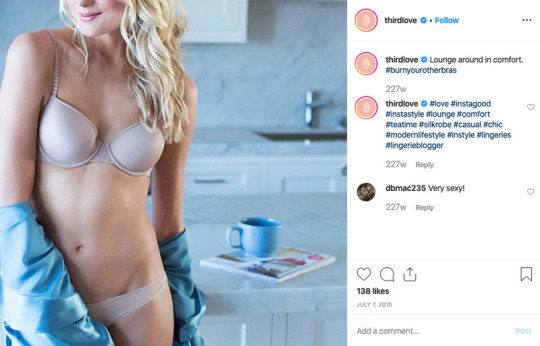
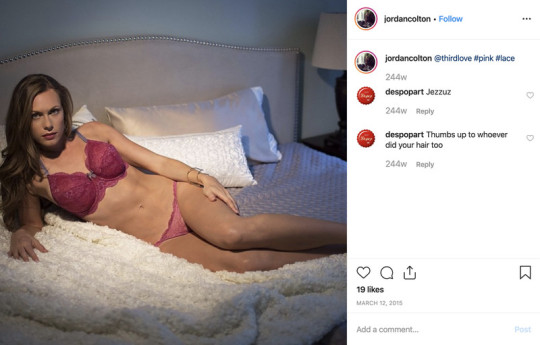
These employees also recall getting pushback when they tried to use diverse models. “We liked to feature models of color in emails and on the homepage, and they [Spector and Cohen] would just ask us to change them. Sometimes they would say it was because white models sell better,” Liz said.
Four recent employees echoed these claims, saying they have had to reshoot entire campaigns — including one titled “to each her own” that celebrated women’s uniqueness — because there were “too many” models of color. “You’d hear comments from Ra’el Cohen that a model of color ‘looked tough’ or that ‘she looks like she’s going to slap a b,’” a member of the marketing team told us. Zak, who said she has been at every photoshoot produced by the brand, said this was untrue.
Tensions around race and identity are still running high inside ThirdLove. Last month, leaked audio obtained by Vox revealed Zak apologized at a company meeting after she and Spector appeared in traditional Mongolian wedding garb on Halloween, offending employees. “As a few of you know, Dave and I were so fortunate this summer to go to Mongolia,” she explained. “We really just wanted to highlight something we felt was really beautiful.” She then asked people to “assume positive intent,” and moved on.
Other aspects of the brand have evolved, employees say. While Natalie remembers Cohen originally not being enthusiastic about offering larger bra sizes — saying “we will never be a plus-size company” on multiple occasions, when asked why ThirdLove didn’t carry larger bra sizes — more recent employees say she has become a strong advocate for bigger bodies. The company now carries over 80 sizes — far more than the typical bra brand — and Zak attributes this in large part to Cohen.
Undisputed is the fact that Spector championed this change. “This is where Dave can be a fascinating human,” Natalie said. While many employees report feeling bullied by his behavior, when he was on their side in an argument, his intensity could be an asset. “Like, he only wanted us to have hot models on our website but then he could be such a pitbull like, ‘This is low-hanging fruit. We have all these women who want this size, we should start carrying it. When are we going to start?’”
This pitbull quality also came out in less than ideal ways. In 2015, when the company launched a free trial program to allow customers to try on bras at home and send them back if they didn’t like the fit, he realized people’s credit cards were getting declined. Some were simply expired, but if customers kept the product, the company didn’t have a good way to recoup the funds, regardless if it was negligence or fraud.
Three employees remember Spector emailing people under a fake name in order to recover the money, claiming that if they didn’t pay up, the company would report them to an agency of online retailers. (No such agency exists.) “If you got too many strikes, you wouldn’t be able to shop online,” Emily recalls Spector telling customers. “It was my first job and I was like, this isn’t normal, right?” In response to this claim, ThirdLove said, “This is a twisted allegation trying to paint something negative which is simply normal business practice.”
Perhaps the company was suffering from the same difficulties as many early-stage startups: things were moving fast, people said things off the cuff, and the founders were zealous in their drive. But employee perception suggests the founders didn’t always take the time to bring the organization’s mission to life inside the company walls, which led to a growing chasm between how executives and their staff saw the brand.
It was around this time that Scott Nathan, a fashion photographer in Los Angeles, was approached about shooting a campaign for a different underwear company, Naja, which had launched in 2014. Naja partnered with women in need to design “underwear with a purpose.” It was founded by the actress Gina Rodriguez and Stanford MBA Catalina Girald.
Naja’s new line was called “Nude for All,” and it boasted an array of bras and underwear for a wide variety of different skin tones. In the photoshoot, Nathan framed 10 “real” women — all with unique jobs and backstories — against a neutral background. The campaign launched in 2016 in subway stations in New York.
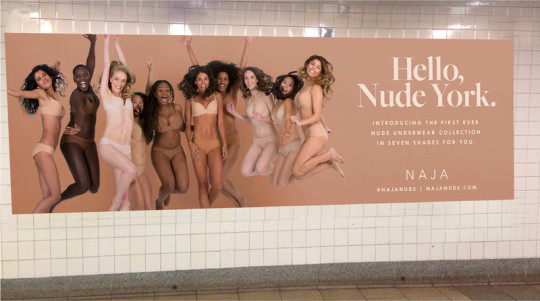
Catalina Girard Behance
Naja’s Nude for All campaign in the New York subway.
Nathan was proud of how the campaign turned out. The images were fresh and showcased Naja’s inclusive values.
A year later, ThirdLove came out with its new campaign, called “The New Naked.” “The industry-favorite brand is launching nude bras for ALL,” Refinery29 announced.
Goodbye "nude", hello Naked. Introducing: The New Nakeds Collection from ThirdLove. Meet the five Naked shades inspired by YOU and find your Naked shade! #FindYourNaked
Posted by ThirdLove on Tuesday, February 7, 2017
Fashion brands often borrow each other’s concepts and draw inspiration from one another. But to Nathan, ThirdLove’s images were too close to his own. “They completely jacked Naja’s campaign,” he opined. “They basically just copied the whole concept.”
Naja was hardly the first company to sell bras for different skin tones; still, ThirdLove employees felt the brand was jumping on a bandwagon in order to beat out a competitor. “It’s strange because originally it was really hard to get them to commit to an authentic image,” recalled Emily. “It was all very skinny neutral women — none of that girl power feeling they are preaching today.”
To ThirdLove’s early employees, watching the company transform from a tech-focused brand to an industry leader in female empowerment has been surreal. Many feel validated that the company now uses diverse models and offers a wide range of sizes, but the change also feels inauthentic. “They’re just opportunistic,” Liz said.
Zak remains steadfast in her belief that the narrative shared by these employees is wrong. “We’ve always been a brand that’s been for all women,” she said, “from the very beginning of the company.”
Sign up for The Goods’ newsletter. Twice a week, we’ll send you the best Goods stories exploring what we buy, why we buy it, and why it matters.
from Vox - All https://ift.tt/2qoUwWR
0 notes
Text
A pivot from tech to empowerment at bra startup ThirdLove

Marketing images for ThirdLove feature models of many shapes and races. | Sarah Lawrence for Vox
How a woke brand is made.
Convincing 100 women to show up at a warehouse and take photos of their chests is no easy feat. Convincing them through a Craigslist ad is nearly impossible. But that’s what lingerie company ThirdLove did in 2013 while developing a proprietary app that was designed to predict better bra sizes.
“The app was problematic, to say the least,” said a former engineer we’ll call Ben. “It basically only worked if the photos were good.” When people tried out the at-home instructions exactly — take two pictures in front of a full-length mirror in good lighting while wearing a tight tank top, making sure the phone is at waist-height — the results were reliably accurate. But getting people to do that was difficult.
“The app was problematic, to say the least”
Then there was the matter of data security. Co-CEO David Spector told Inc the company never “recorded” people’s images, but no one was clear on what that meant. Once the photos were submitted via the app, where did they go?
After securing $8 million in funding, ThirdLove stopped developing the app. The technology was complicated, the data difficult to get right. In its wake, the founders doubled down on a narrative that would help set them apart in the competitive but old-school lingerie market: diversity and female empowerment.
To co-CEO Heidi Zak, these tenets had been there all along. “We set out to build a brand for all women of all sizes,” she told Vox. “Look at what we’ve done in the past year or two” — the company has featured diverse models in almost all of its recent marketing campaigns — “We wouldn’t do all these things if that wasn’t core to who we are.”
Many employees aren’t buying it. “It’s all about the money,” said a member of the marketing team we’ll call Liz. Interviews with 10 current and former employees, all of whom asked to remain anonymous, paint a picture of ThirdLove’s transformation, from a data-driven bra brand to a bastion of diversity and inclusion, as one of keen opportunism. The gap between their viewpoint and the founders’ suggests that while the company has succeeded in pushing the lingerie industry to be more inclusive on multiple fronts, it has a long way to go to convince the workers who helped build the brand of its motives.
David Spector and Heidi Zak founded ThirdLove (then called MeCommerce) in 2012 to improve the bra shopping experience. Both came from big tech backgrounds — Zak worked at Google, Spector at the investment firm Sequoia Capital. Early documents list Spector as the CEO and Zak as the president, although today, they co-lead the company and ThirdLove is touted as “female-run.” Their first hire, Ra’el Cohen, continues to head up the design team.
The initial concept was to use computer vision technology to predict more accurate bra sizes. People took photos of themselves using ThirdLove’s proprietary app; computer vision technology then processed the images, and suggested a personalized fit.
To alleviate privacy concerns, Spector was careful to highlight the company’s data sharing policy in interviews, noting privacy was of the “utmost importance” and leading reporters to say the images were “processed without ever being recorded by ThirdLove.”
This was 2013, so a computer vision underwear app was revolutionary. “Want a bra that fits perfect? This billionaire-backed app helps with just your iPhone,” wrote Forbes. “How a NASA scientist helped size my bra,” added Fast Company.
“The story was that the app could size you better than a sales rep in a store, which seemed pretty innovative”
ThirdLove did have a scientist helping them develop the technology. Ara Nefian, a researcher at Carnegie Mellon who contracted at NASA, worked on the apps and nights and weekends, and even he said the technology presented difficulties. “It relied heavily on accurately following the directions and that was a bit complicated,” he explained.
Regardless of the complications, when a woman we’ll call Natalie joined the company in 2014, she was immediately blown away by the technology. “The story was that the app could size you better than a sales rep in a store, which seemed pretty innovative,” she said. “I was really excited about the idea of working at a startup.”
Unlike many of ThirdLove’s recent employees who thought they were joining a female-led company and felt blindsided when they realized Spector’s involvement, Natalie joined for the technology, not the feminist credentials.
Three months into her tenure, however, she was told they were abandoning the app. Computer vision “was just a buzzword,” she realized, even though the tech stayed on the App Store. When she began to ask questions (How would they know people’s sizes? What was going to happen to all the data?), she was told not to worry — the company had stopped using data from the photos anyway.
The reality was slightly more complicated. By late 2014, Nefian had stopped working on the app, and the technology quickly went defunct. It had been finicky when he was involved. Without him, it was almost unusable.
Privacy was also a concern. Women were writing in asking where their photos were going, especially since some had included their faces in the pictures. Employees didn’t know how to respond, but it was clear the app was “freaking people out,” Ben said. Were the photos stored by ThirdLove? The employees themselves still aren’t sure today; the company vehemently denies the photos “were ever stored on any kind of server of any kind,” or even on a “camera roll.”
Nevertheless, ThirdLove began asking users questions about people’s current bra size and fit to get a more reliable read. It was a method that ultimately led to the fit finder quiz they now use.

Thirdlove via The Daily Mail
Screenshot of Thirdlove’s AI App

Thirdlove via The Daily Mail
A screenshot of Thirdlove’s AI App.
By the end of 2015, the computer vision project had been more or less scrapped, and the media story around ThirdLove began to change. Over the next few years, they became the brand that actually understood breast shape. The company that called out Calvin Klein for sexist ads. The founders that fought for LGBT rights. They called themselves the “antithesis of Victoria’s Secret” and championed inclusivity in terms of both skin tone and size. It was a narrative that would ultimately stick.
ThirdLove’s 2014 marketing bears little resemblance to that of the company people know and love today. Their initial brand persona — the fictional customer they designed their products for — was a heterosexual white woman in her mid-thirties living in Brooklyn, according to three former employees. “She’d meet her co-workers at rooftop bars for drinks after work. It was like Sex and the City,” Liz said. “That’s how ThirdLove started — it wasn’t about being inclusive.”

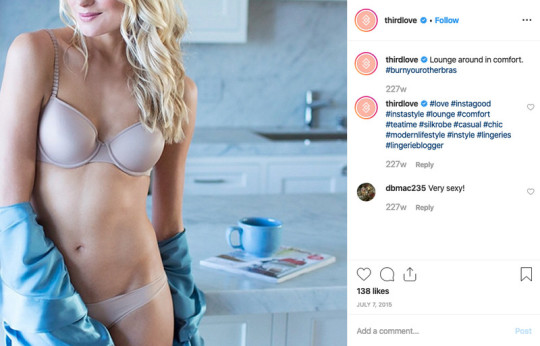

These employees also recall getting pushback when they tried to use diverse models. “We liked to feature models of color in emails and on the homepage, and they [Spector and Cohen] would just ask us to change them. Sometimes they would say it was because white models sell better,” Liz said.
Four recent employees echoed these claims, saying they have had to reshoot entire campaigns — including one titled “to each her own” that celebrated women’s uniqueness — because there were “too many” models of color. “You’d hear comments from Ra’el Cohen that a model of color ‘looked tough’ or that ‘she looks like she’s going to slap a b,’” a member of the marketing team told us. Zak, who said she has been at every photoshoot produced by the brand, said this was untrue.
Tensions around race and identity are still running high inside ThirdLove. Last month, leaked audio obtained by Vox revealed Zak apologized at a company meeting after she and Spector appeared in traditional Mongolian wedding garb on Halloween, offending employees. “As a few of you know, Dave and I were so fortunate this summer to go to Mongolia,” she explained. “We really just wanted to highlight something we felt was really beautiful.” She then asked people to “assume positive intent,” and moved on.
Other aspects of the brand have evolved, employees say. While Natalie remembers Cohen originally not being enthusiastic about offering larger bra sizes — saying “we will never be a plus-size company” on multiple occasions, when asked why ThirdLove didn’t carry larger bra sizes — more recent employees say she has become a strong advocate for bigger bodies. The company now carries over 80 sizes — far more than the typical bra brand — and Zak attributes this in large part to Cohen.
Undisputed is the fact that Spector championed this change. “This is where Dave can be a fascinating human,” Natalie said. While many employees report feeling bullied by his behavior, when he was on their side in an argument, his intensity could be an asset. “Like, he only wanted us to have hot models on our website but then he could be such a pitbull like, ‘This is low-hanging fruit. We have all these women who want this size, we should start carrying it. When are we going to start?’”
This pitbull quality also came out in less than ideal ways. In 2015, when the company launched a free trial program to allow customers to try on bras at home and send them back if they didn’t like the fit, he realized people’s credit cards were getting declined. Some were simply expired, but if customers kept the product, the company didn’t have a good way to recoup the funds, regardless if it was negligence or fraud.
Three employees remember Spector emailing people under a fake name in order to recover the money, claiming that if they didn’t pay up, the company would report them to an agency of online retailers. (No such agency exists.) “If you got too many strikes, you wouldn’t be able to shop online,” Emily recalls Spector telling customers. “It was my first job and I was like, this isn’t normal, right?” In response to this claim, ThirdLove said, “This is a twisted allegation trying to paint something negative which is simply normal business practice.”
Perhaps the company was suffering from the same difficulties as many early-stage startups: things were moving fast, people said things off the cuff, and the founders were zealous in their drive. But employee perception suggests the founders didn’t always take the time to bring the organization’s mission to life inside the company walls, which led to a growing chasm between how executives and their staff saw the brand.
It was around this time that Scott Nathan, a fashion photographer in Los Angeles, was approached about shooting a campaign for a different underwear company, Naja, which had launched in 2014. Naja partnered with women in need to design “underwear with a purpose.” It was founded by the actress Gina Rodriguez and Stanford MBA Catalina Girald.
Naja’s new line was called “Nude for All,” and it boasted an array of bras and underwear for a wide variety of different skin tones. In the photoshoot, Nathan framed 10 “real” women — all with unique jobs and backstories — against a neutral background. The campaign launched in 2016 in subway stations in New York.
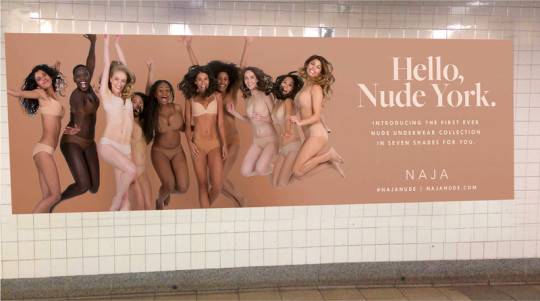
Catalina Girard Behance
Naja’s Nude for All campaign in the New York subway.
Nathan was proud of how the campaign turned out. The images were fresh and showcased Naja’s inclusive values.
A year later, ThirdLove came out with its new campaign, called “The New Naked.” “The industry-favorite brand is launching nude bras for ALL,” Refinery29 announced.
Goodbye "nude", hello Naked. Introducing: The New Nakeds Collection from ThirdLove. Meet the five Naked shades inspired by YOU and find your Naked shade! #FindYourNaked
Posted by ThirdLove on Tuesday, February 7, 2017
Fashion brands often borrow each other’s concepts and draw inspiration from one another. But to Nathan, ThirdLove’s images were too close to his own. “They completely jacked Naja’s campaign,” he opined. “They basically just copied the whole concept.”
Naja was hardly the first company to sell bras for different skin tones; still, ThirdLove employees felt the brand was jumping on a bandwagon in order to beat out a competitor. “It’s strange because originally it was really hard to get them to commit to an authentic image,” recalled Emily. “It was all very skinny neutral women — none of that girl power feeling they are preaching today.”
To ThirdLove’s early employees, watching the company transform from a tech-focused brand to an industry leader in female empowerment has been surreal. Many feel validated that the company now uses diverse models and offers a wide range of sizes, but the change also feels inauthentic. “They’re just opportunistic,” Liz said.
Zak remains steadfast in her belief that the narrative shared by these employees is wrong. “We’ve always been a brand that’s been for all women,” she said, “from the very beginning of the company.”
Sign up for The Goods’ newsletter. Twice a week, we’ll send you the best Goods stories exploring what we buy, why we buy it, and why it matters.
from Vox - All https://ift.tt/2qoUwWR
0 notes
Text
El crecimiento del Ecommerce: informe ONTSI 2013
Hace poquitos días se publicaba el Estudio sobre Comercio Electrónico B2C 2012 realizado por el Observatorio Nacional de las Telecomunicaciones y de la Sociedad de la Información (ONTSI) y como podemos ver en el mismo, el ecommerce está de enhorabuena, consiguiendo un incremento de un 13,4%, una subida algo inferior a la del año anterior que se encontraba en un 19,8%.
El volumen de ventas del B2C en España, generando 12.383 millones de euros, con 15,2 millones de internautas compradores y un gasto medio por internauta de unos 816€. Al ver este dato me he quedado pensando que yo debo estar un poco antigua, ya que no era consciente de hacer compras online por este importe, pero al ver los productos más vendidos, billetes de transporte, me ha hecho poner los pies en el suelo. Y es que con que tan sólo compres unos billetes de tren, alojamiento y alguna que otra cosilla más, llegas de sobra a este importe y como en mi caso lo pasas (sobre todo si te ocurre como a mí que al comprar dos billetes de AVE, Renfe te carga en la tarjeta cuatro y tarda en devolvértelo aproximadamente un mes).
Entre las categorías de productos que más han aumentado el porcentaje de internautas compradores están los servicios de internet y telefonía 16,4% (incremento 5,7pp) y libros, revistas y periódicos 16,4% (incremento 5,1pp). Este último dato habrá puesto muy contento a nuestros amigos de Amazon.
El mCommerce se ha hecho con 2,1 millones de usuarios, representando un incremento de un 15,1% respecto del año anterior. El fuerte crecimiento que está teniendo el mCommerce es un dato bastante relevante a tener en cuenta para cualquier empresa que venda por internet, debiendo incluir en su estrategia online, una web adaptada a dispositivos móviles (responsive web design), tener versiones diferenciadas tanto para tablet como para smartphone o algún tipo de app, ya sea nativa o híbrida.
En cuanto al perfil del comprador internauta, a pesar de tener las mujeres la fama de que nos encantan las compras, es hombre, de edad entre 25-49 años. Se amplía el rango de edad en el perfil de nuevo internauta, hombre, con edad entre 15-24 años y mayores de 65 años. Consecuencia de esto probablemente sea la fuerte presencia de los smartphones entre los adolescentes, unido a que las nuevas generaciones están más familiarizadas con lo digital (nativos digitales). En cuanto los mayores sumándose a este perfil los mayores de 65 años. Y es que cada vez hay más personas que al jubilarse les entra la curiosidad por aprender sobre nuevas tecnologías, teniendo una mayor presencia este colectivo en internet.
Las tiendas online son las preferidas por los internautas compradores (48,7%, incremento de un 7,8%), antes que las web de los fabricantes y de las tiendas físicas que venden también por internet. Quizás la situación económica de España, favorece la compra de cupones y descuentos situándose en un 26,8% con un incremento, respecto del año anterior, de un 4,5%.
Y habrá muchos jefes que se habrán puesto contentos al ver que el 93,5% de las compras se hacen desde la casa y no desde el trabajo.
Como medio de pago estrella la tarjeta de crédito con un 62,9%, muy por delante del resto de medios de pago.
Ha aumentado la frecuencia de compra pasando de 8,44 a 9,95 y el número de categorías de productos, que pasa de 3 a 3,46.
Sin embargo, y a pesar de tanto número positivo, nos sacan tarjeta roja en los problemas que han tenido en las compras por internet, experimentando un crecimiento de un 1,9 pp, situándose en un 9,6%, siendo el principal motivo la llegada de productos estropeados (39%) y el retraso en las entregas (32%). Así que ojito con la logística!
Y haciendo una escucha activa, podemos decir que a los compradores internautas no le gustan eso de los gastos de envío, así lo manifiestan el 78,4% y puestos a pedir, también quieren que los precios deberían ser más bajos (72,6%). Los no compradores indican que prefieren ir a la tienda a comprar (69,3%) y se muestran reacios a dar sus datos personales (67,7%). Y los excompradores prefieren ir a la tienda física a comprar (67,4%), probablemente entre ellos se encuentren parte de ese 9,6% que han tenido problemas con sus compras.
Precio, comodidad y ahorro de tiempo son los tres mayores impulsores de la compra en el comercio electrónico, y es que no hay nada mejor que ir de compras sin salir de casa.
El 65,9% de los internautas compradores son usuarios de redes sociales, recurriendo a las mismas para buscar información, comparar precios e incluso para efectuar la compra.
Entre las conclusiones que podemos sacar:
Perfil comprador online: hombre de 25-49 años, sin descuidar al nuevo perfil de 15-24 años y mayores de 65 años.
La importancia del uso del móvil en las compras, por lo que es imprescindible tener una web accesible desde cualquier dispositivo.
La gente compra desde casa, sin embargo no tenemos datos desde donde hacen las búsquedas y las comparaciones de precios ¿será también desde casa o desde el trabajo?.
Un importante incremento en las compras de cupones y descuentos, con un perfil comprador de mujeres menores de 50 años, por lo que puedes sopesar si esta opción encaja con tu negocio.
La importancia de las redes sociales en la venta online teniendo en cuenta que uno de cada tres internautas se ha relacionado con la marca a través de redes sociales.
Aumento de los problemas con las compras por internet, por lo que una buena coordinación de logística y atención al cliente, puede ser esencial para diferenciarte de tu competencia.
0 notes
Text
Vote Matt for SXSW Panel!
Our awesome CEO, Matt Lauzon, is in the running to go to SXSW and tell the world how Gemvara is going to revolutionize #meCommerce and the way people shop for jewelry; customization is going to rule the world! Not only is Matt a rad businessman and visionary, but he's a successful CEO that's only 26! Help spread the news, vote for us, and maybe we'll get some bonus points with the boss.
Click on the image to vote!
0 notes
Video
Have a great weekend everybody, let's not make this about you know what . Make it about Love and all the people who deserves love , and while your at it come join kargoe.com the next movement to change social media for the 99% . #mecommerce #metailing #votewithyourdollar (at Warren Store)
0 notes
Photo

Dad it's my future too !! Be the change come join kargoe . Kargoe.com #mecommerce #golargoe (at One Dag Hammarskjold Plaza)
0 notes
Video
instagram
Goodmorning to one of the 80000 days we have on this planet , here @karliekloss on the new kargoe app , the world is in constant change a movement , so is social media here's a platform for the 99% who starts the social Mecommerce. @makeup @charlottewillermakeup . With @lorealmakeup . #makeup #lovemyjob #socialmecommerce (at Chelsea, Manhattan)
1 note
·
View note
Photo

Come join kargoe on Union sq ,sign up for a social Mecommerce platform that you can believe in a place where you can shop sell and endorse beauty products and sell or upcycle things you don't need or donate the proceeds to earthday initiative.
0 notes
Photo

@gokargoe it's getting closer to birth the next social Mecommerce platform for the long tail , this week we are partnering up with @earthdayinitiative to help them change people's conscious and awareness about the simple 50 things you can do to make a impact on the environment. Come see us on union square on Tuesday for Earth day and come be part of our beta !#makeup #beauty #socialmecommerce
0 notes
Photo

It's a great day for the kargoe team we have been pushing hard to get to this point , let us know if you wanna be a beta tester and help us the last mile , to start this fire 🔥. Kargoe is the social Mecommerce platform for you and brands who says yes to a better planet for all of us . Come join something you can believe in !! #socialmecommerce #gokargoe #beauty #makeup #hair (at Chelsea, Manhattan)
0 notes
Photo

On set today with this young beauty @jillian_jaymes , all with Gratitude to be found next on the kargoe app join the movement of social Mecommerce. (at Pier59 Studios)
0 notes
Photo

Tbt# Got back to NYC , of to Paris on monday happy to know @kargoe has been submitted to the App Store !! So now it's exciting times to roll out the new social Mecommerce app , where we can vote and change the world with your dollar , together with your tribe . (at Kenneth Willardt Photography and Film)
0 notes